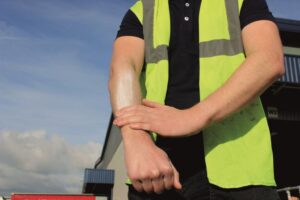New research into attitudes towards UV protection at work revealed that one third of outdoor workers never apply sun protection cream on the job. SHP hears from at-work skin care, cleaning & hygiene solutions provider, SC Johnson Professional.
 Melanoma skin cancer is the fifth most common cancer in the UK, accounting for 4% of all new cancer cases.
Melanoma skin cancer is the fifth most common cancer in the UK, accounting for 4% of all new cancer cases.
Despite this, a YouGov survey commissioned in April 2023 by SC Johnson Professional found that 30% of outdoor workers never apply UV protection cream whilst at work.
A third (34%) of these respondents claimed that nothing would encourage them to do so, illustrating the scale of the challenge faced by employers.
The findings of this survey build on the company’s previous research into attitudes towards UV protection at work, of both those who work outdoors as well as decision makers and health and safety managers in relevant sectors.
In this most recent research, a representative sample of workers in the UK were surveyed, with a total of 558 people who regularly worked outdoors responding, with the aim of looking into the reasons for the lack of use of UV protection at work.
A look at employer provision and responsibility
16% of those who never use sun protection at work said this was because it wasn’t provided by their employer.
Having this protection provided by their workplace was cited by almost a quarter (24%) as something that would encourage them to use UV protection – and more than a fifth (22%) also stated that having sun protection cream accessible when needed would encourage usage.
Employees who work outdoors every day should therefore protect their skin and eyes from the sun all year round. Along with sun protection cream it is important to avoid the midday sun, spend breaks in the shade and wear long-sleeved clothing, headgear and sunglasses.
The Health and Safety at Work Act states that there is a legal duty on every employer to ensure, as far as reasonably practical, the health of their employees. The Management of Health and Work Regulations also requires the employer to conduct a suitable assessment of the risks to the health of their workforce, including those risks from UV radiation.
Providing good quality sun protection cream when and where it is needed, such as workplace entrances/exits and outdoor areas, is one simple way that employers can fulfil their duty of care and raise awareness of the risks of over-exposure. According to the research referenced later in this article, it is also one of the most effective ways to encourage UV protection usage in itself.
Why don’t outdoor workers use UV protection?
 A third of those who never use UV protection at work said in the survey that they didn’t think it was necessary. Further to this, 28% stated that they don’t burn easily in the sun, citing this as their reason for never using UV protection.
A third of those who never use UV protection at work said in the survey that they didn’t think it was necessary. Further to this, 28% stated that they don’t burn easily in the sun, citing this as their reason for never using UV protection.
It is advised that, once the UV index reaches 3 or above, sun protection measures should be taken. During the summer months in the UK, the UV index regularly exceeds this level, and according to the Met Office, UV rays can be strong enough to cause sunburn in the UK between April to September.
As well as this, 80% of UVA rays pass through clouds. What is clear, is that UV protection is recommended and required during this 6 month period in the UK – more awareness is needed to encourage those who work outdoors to use it.
Employees should be encouraged to protect their skin all year round, applying broad-spectrum sun protection cream with a high sun protection factor that protects against UVA, UVB, and UVC rays to clean and dry skin about 15 – 20 minutes before exposure to the sun, and reapply at least every two hours.
Training and awareness
Significantly, the research found that, of those who never apply sun protection cream at work, over a third (34%) state that nothing would encourage them to do so. However, nearly two thirds (61%) of those who work outdoors agreed that understanding the effects of UV damage encourages them to use sun protection cream at work.
Further to this, when comparing responses from those who work outside more than 25% of the time with those who spend more than half their working time outdoors, our survey found little difference between attitudes towards UV protection.
As well as ensuring the health of employees, the Health and Safety at Work Act states that employers must provide ‘information, instruction, training and supervision’ to ensure their workforce’s safety. As a decision maker or health and safety manager, the challenge is to encourage those who never use UV protection to consider it, and to help outdoor workers understand the effects of UV damage – even if employees spend the majority of their time working outside, they may still be unaware of the risks it can bring.
Considering the demographics of outdoor workers
 When taking a deeper dive into how gender affected respondents’ answers, it was found that women are significantly more likely than men to apply sun protection cream at work at least once per day (28% vs 18%), and that men are more likely to think that sun protection cream is unnecessary at work (36%) than women (21%).
When taking a deeper dive into how gender affected respondents’ answers, it was found that women are significantly more likely than men to apply sun protection cream at work at least once per day (28% vs 18%), and that men are more likely to think that sun protection cream is unnecessary at work (36%) than women (21%).
It is more difficult to encourage men to use sun protection cream at work than women; 38% of men said nothing would encourage them to do so, versus 25% of women.
When looking at age, SC Johnson Professional wanted to see if it had an impact on the workers’ attitudes towards sun protection measures. The survey revealed the older the respondent, the more likely they are to feel that high UVA and UVB protection is important in a sun protection cream.
These guidelines apply to anyone who spends time working outdoors, especially construction workers. As employers, it’s important to take action and encourage your workforce to prioritise UV protection by following best practice.
Find out more about SC Johnson Professional’s resources and product range here.
All figures, unless otherwise stated, are from YouGov Plc. Total sample size was 4435 adults, of whom 558 were outdoor workers. Fieldwork was undertaken between 14 – 18 April 2023. The survey was carried out online. The figures have been weighted and are representative of all UK adults aged 18+.
What makes us susceptible to burnout?
In this episode of the Safety & Health Podcast, ‘Burnout, stress and being human’, Heather Beach is joined by Stacy Thomson to discuss burnout, perfectionism and how to deal with burnout as an individual, as management and as an organisation.
We provide an insight on how to tackle burnout and why mental health is such a taboo subject, particularly in the workplace.


 A third of those who never use UV protection at work said in the survey that they didn’t think it was necessary. Further to this, 28% stated that they don’t burn easily in the sun, citing this as their reason for never using UV protection.
A third of those who never use UV protection at work said in the survey that they didn’t think it was necessary. Further to this, 28% stated that they don’t burn easily in the sun, citing this as their reason for never using UV protection. When taking a deeper dive into how gender affected respondents’ answers, it was found that women are significantly more likely than men to apply sun protection cream at work at least once per day (28% vs 18%), and that men are more likely to think that sun protection cream is unnecessary at work (36%) than women (21%).
When taking a deeper dive into how gender affected respondents’ answers, it was found that women are significantly more likely than men to apply sun protection cream at work at least once per day (28% vs 18%), and that men are more likely to think that sun protection cream is unnecessary at work (36%) than women (21%).